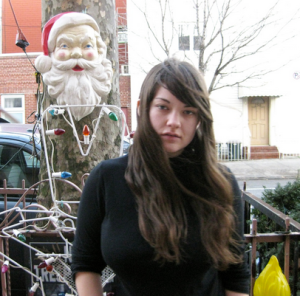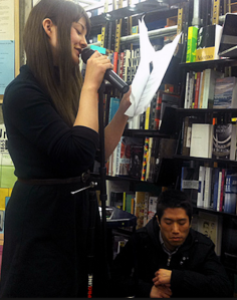
Calloway’s constant need for reassurance and some form of tangible affection is present throughout the entirety of the book. And, in many ways, her unabashedness in making this clear is both endearing and cringe-worthy. The moment Calloway chooses to introduce herself is telling, as, for some reason, it always seems more significant for a woman to talk about losing her virginity than a man. Particularly when the woman in question is a victim of sexual abuse and is endlessly self-conscious about her appearance. Calloway, thus, finds it all too appropriate to begin her story where life begins–her vagina. From this first innocent enough tryst, we’re taken to Calloway’s first paid sexual experience in London. Her fascination with documenting every demeaning sex act conveniently aligns with her need for money. The tragicomic nature of it all is accented by her justification:
“I need money for BareMinerals foundation and MAC lipstick and soy lattes and pizza. If I earn money I will no longer be a financial burden on my parents; I will be productive and accomplish something. I will be a commodity, and I will be in demand and valuable… sex work will reify my youth and beauty.”

Her emotional floundering and cavalier approach to sex is reflective of so many women who feel an equal or similar sense of detachment from fucking. Because how can you not dissociate when everything seems so insignificant and casual? And so, in response, Calloway has taken it upon herself to turn her own person into the object instead of being made into it in the end. While this may be a cursorily effective defense mechanism at the outset, it becomes quite clear that it’s causing Calloway damage in the long term.
Regardless of enduring experience after experience of what could objectively be called sexual trauma, Calloway still maintains an air of decided purity. In fact, the presence of grammatical mistakes like “…I would probably always feel stifled and overshadowed unless I were to somehow totally disavowal [Tao] Lin from my life and career” also adds to the amateurish, yet earnest quality of the prose.

While Calloway’s short stories are engaging, the prevalence of her Facebook excerpts and dialogue exchanges grow wearisome quite quickly, and perhaps this is a form of writing that will eventually become more acceptable as the twenty-first century progresses, but, as of now, there is something about it that comes across as too easy, too cobbled together for mass consumption and interpretation.

Her overtness in getting off on being talked about in a negative light is consistently evident, especially during any description of a sexual encounter. Even though there is another part of her that relishes praise, it appears that her lust for having all of her worst fears about herself confirmed trumps the lust for validation. This much is made discernible when she acknowledges, “I wondered when I would stop abusing myself for the sake of new experiences, new sensations.” For as long as Calloway chooses to be a self-appointed sociologist of boning, the abuse isn’t likely to subside.

In spite of the frequent moments where you feel uncomfortable for how disarmingly honest Calloway is about every emotion she’s feeling at any given second, there are also moments when you can’t help but completely identify with her. For instance, in the baring admission,
“I feel that my entire social existence amounts to a burden for other people, about how guilty I feel for making them interact with me, and how I know that the only hope for anyone to enjoy interacting with me is if I’m somehow able to conceal my real personality.”

Then again, for as many times as you feel like you identify with Calloway, there are just as many when you want to shake her for what seems like an overall ennui about being a writer, with statements like, “I’m not intelligent enough to have an opinion” and “Writing is just something that I’ve done everyday since I was like seven years old and it feels like something I have to do, the same as with eating or whatever, but I feel like I come off as pretentious or taking myself really seriously if I say that. I don’t want to be pretentious or ambitious and I despise those qualities in people. I hate any sort of artifice.” Her uncertainty is both her blessing and her curse throughout what purpose did i serve in your life. That, and her unfortunate, none too subtle pseudonyms (e.g. “Adrien Brody” for Rob Horning and “Jeremy Lin” for “Tao Lin”).

Her preoccupation with image and coming across a certain way is so very much a part of a generational concern that will presumably only augment as we become more attuned with social media designed to document our every prosaic move. But Calloway’s entire shtick is enmeshed in using the sexual to stamp out the mundane. Even when she isn’t entirely sure about the merit of a specific sexual act (e.g. when she has a threesome and thinks, “Part of me wanted to cry. I felt like they saw me as, were using me like, a machine.”), she still just does it for the sake of doing it. ‘Cause fuck it, this is life and you only live it once.

Calloway may have invented an entirely new genre in literature, one that is accessible and easily understandable. But the real purpose of her book is to reveal the current climate in the world of twentysomething sentiments, which is largely characterized by schizophrenic aims–all made clear by the comment, “I wondered if I would ever be able to reconcile my ambition to be a serious writer with my desire to be loved.”



















